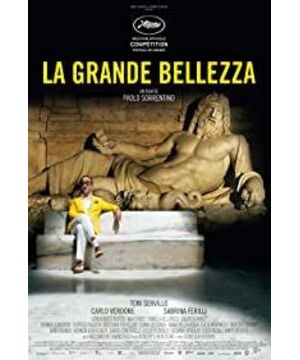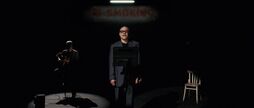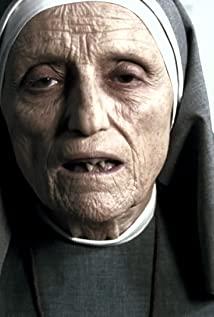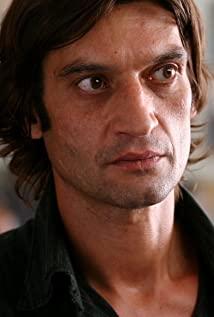I'm also curious to know what the hell I'm writing about.
From a neutral and objective point of view, "The Beautiful City" is not a perfect work, it is not a balanced work, it sacrifices its own clarity for the sake of beautiful form. But when it comes to movies, I've never been an objective person, and to some extent, it's this shortcoming that makes it philosophical beyond the movie itself.
Slow rhythms and obscure language are usually not the virtues of a movie, except in one case where the movie is about life itself. Therefore, being objectively obscure and a little boring is not a big problem, and what I mean by objectively here is that I don't find it obscure and boring. Many people think this is an obscure and "pretending" film, but I think it's a bit unfair.
This is not an unintelligible movie. There is neither a complex narrative structure nor too many confusing lines. The plot is a bit jumpy, but it is not "brain-burning". The only obscure thing is The absurdity of "nothing to say" on the surface. It is like the moon in the pool, people think it is far and deep, but it is actually on the surface. It talks too much about the obvious, yet it's a little vague, with a depth that's hard to reach. But this profoundness is also real, but it is just below the superficiality, not outside it.
Hypocrisy, or absurdity, one has to choose one. In almost half of the plots, the director is either directly or quietly mocking the hypocritical person, the liar artist Talia full of party spirit, the third-rate writer Stefania also full of party spirit, the art collector who smells of copper, and the master of cooking. Bishop Bellucci, and the long-tongued bald assistant with the mouth of a saint. They are either driven or just greedy, ridiculous and a little pitiful. However, although hypocrisy is absurd, the opposite of hypocrisy is still absurd, Jep happily pierces Stefania's lies, but the rest is just absurd and meaningless life. Back in the restaurant where jep and ramona were dating, facing Andrea's questioning about death, jep played the role of stefania again, detouring around the absurdity of life, but jep was not a rhetorical person after all, and he didn't seem so much. ridiculous.
In the face of this direct questioning, the uneasy Ramona seems to be completely different from Andrea, but they are two sides of the same body. Ramona resists death, while Andrea pursues death, Ramona enjoys the experience, and Andrea seeks the answer. But they are all real people, pure people, they are symbols of body and spirit, they both face the absurdity and meaninglessness of life, but choose very different. In a way, everyone is a combination of Andrea and Ramona. The search for and fear of death, the desire and disappointment for answers, make up and torment us.
Jep is this combination, Andera and Ranonas are pure, and he is contradictory, sensuality can't satisfy him, but he is deeply involved in it. He couldn't give the answer, but it wasn't his fault either. Under the delicate feeling of the absurdity of life, any answer was vulnerable. The mind and the body are intertwined and bound to each other, the soul screams between the hot and the cold, but there is only silence stuck in the throat, he wants to write a novel that says nothing, but he can't do everything. No one said. He needs a backing.
So he has been searching, intending to find support from the outside world, he intends to grasp the beauty, but his hands are nothing but ordinary things. He even tried to seek a little solace from the hypocritical bishop, just for the existence beyond this world. He wanted to be Prometheus, but got caught in the Sisyphus puzzle.
If you want to dissolve everything, then everything can be dissolved. The solemn form, the sacred symbol, dissolves in the embarrassment of the saint's flesh. But the holiness itself is the refusal to dissolve, and only the refusal itself is an undeniable existence. The meaning is not real, but a firm step towards this pure meaninglessness transcends it. To be holy is to reject, to be irresistible, and to embrace the absurd is to reject the absurd.
The answer is never outside. As Maria said, the root. For Jep, it was beauty, not a woman, not a splendid Rome, but a memory. This should be disappointing, this is not eternal, even short-lived for only a moment, this is not within reach, and even the connection of time has been cut off. He once thought that this beauty could resolve his own contradictions, but now, the contradictions still exist, only creation replaces pursuit. Suddenly, life transcended contradiction. There is no answer in life, and no answer is the answer.
People are looking for the support of life and the meaning of darkness. Under the illusion of the afterlife, they pray for a pale eternity, and the sound of the death knell will eventually dispel all expectations. We can't find it, because love is haunted by pain and passion is consumed by silence, but there is an experience that transcends unanswerable questions. Yes, everything is a trick, there is never any answer, but if there is a trick, there is only one trick that can transcend this fate, and must transcend this fate.
View more about The Great Beauty reviews










